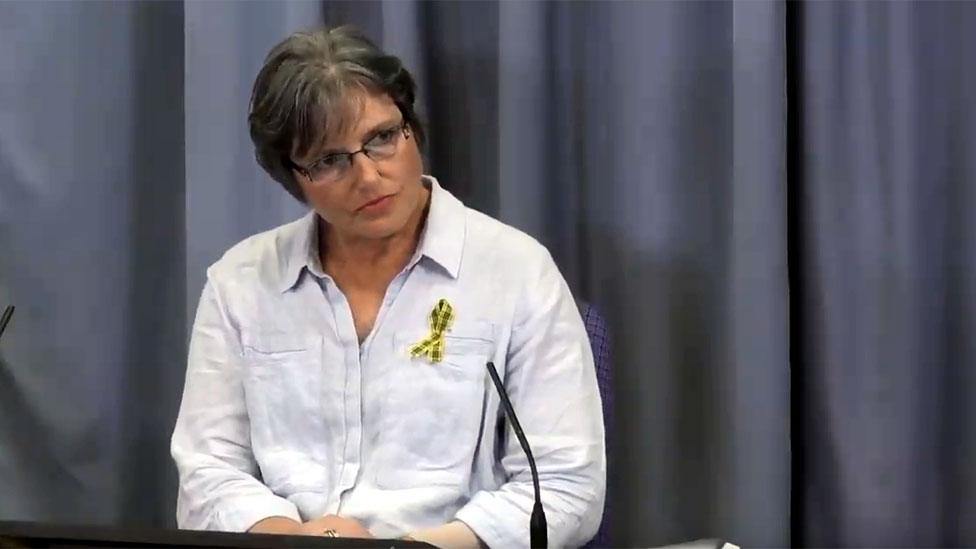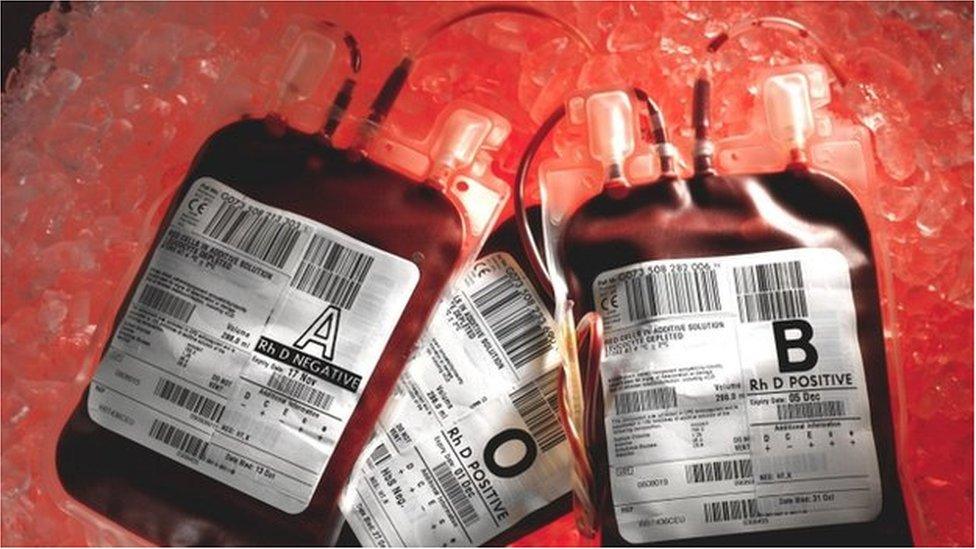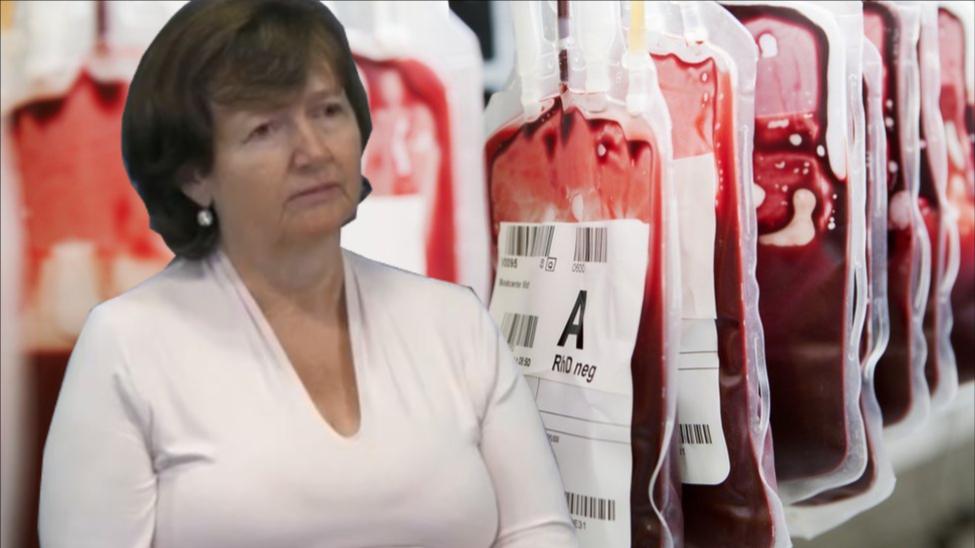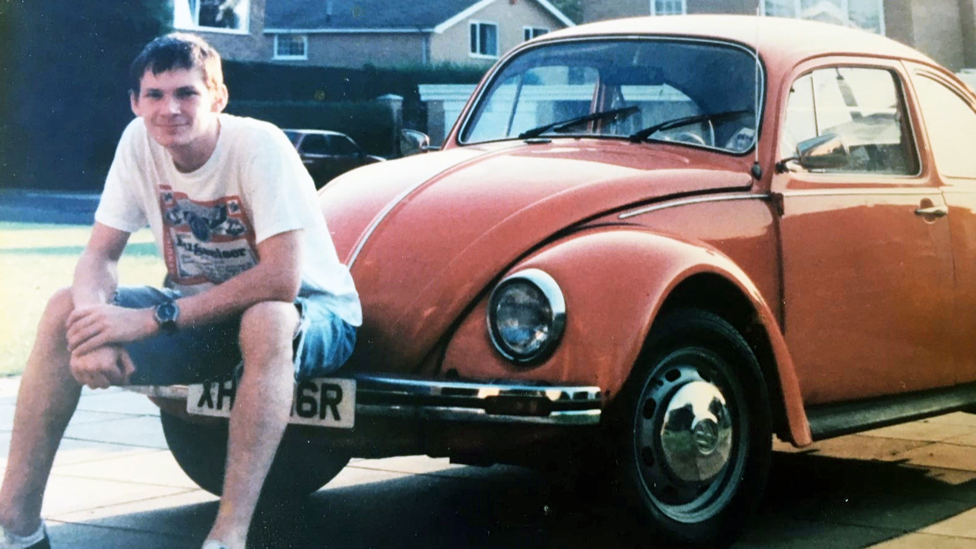Contaminated bloods' 'devastating' toll on Highlands family
- Published

Chris Norval was giving evidence on her husband Bruce's health to the Infected Blood Inquiry
The poor health of a victim of the contaminated blood scandal and his campaign for truth had a "toxic" effect on family life, his wife has said.
Bruce Norval, from Inverness, is among thousands of patients infected with hepatitis C via contaminated blood products in the 1970s and 1980s.
Others were infected by HIV and around 2,400 people have died.
Chris Norval has told a hearing of the impact on the lives of her and her daughter and son.
'If tears were ink'
Earlier, the Infected Blood Inquiry in Edinburgh heard that an organ donor infected with HIV from a contaminated blood transfusion passed on the virus to all the recipients of his donated kidneys, heart and liver.
Two recipients are known to have died.
The husband of a woman who died said: "If tears were made of ink, then I could write a book about the wonderful person who was so cruelly taken from me all those years ago."
Mr Norval's relentless effort to uncover the truth behind the administrating of contaminated products was in addition to the stress of his severe ill health, the inquiry heard.
Mrs Norval told the hearing she considered taking her own life, while her daughter, now 28, has been hospitalised on psychiatric wards including on an occasion when she should have been celebrating her 21st birthday.
When he was a child the Norvals' son, now 22, thought it "normal" to return home and expect to find his father to be dead, the inquiry also heard.
Paragraphs from Mr Norval's written evidence to the inquiry were read out, including a passage where he described the state of his health having a "devastating" effect on his loved ones.
But Mrs Norval also told the inquiry that her family was "standing together", determined to help bring those "who had contributed" to the scandal to task.
Black address book
The Norvals first met in London while they were working as nurses. Mr Norval told Chris he was a haemophiliac, but he did not know at the time he had hepatitis C.
Mrs Norval said her husband did not learn that he had the virus until 1990, the same year their daughter was born.
She said a doctor, who was "rushing" to attend another clinic, leaned on a door frame and told her husband he might get cancer "but probably wouldn't".

Thousands of people have been caught up in the blood scandal
Mrs Norval said the diagnosis left her husband with devastating worries over their daughter's health, and a deep distrust of medical professionals.
Mr Norval's ill health and the family's struggles financially took its toll, the hearing heard. At one point the Norvals were warned they could be evicted from their council house over unpaid rent.
Later medical treatment did clear the virus, but Mr Norval has not recovered from its severe symptoms which include vomiting, severe fatigue and depression.
Mrs Norval spoke frankly and emotionally about the effect this and her husband's campaigning, combined with with worries over his health, had on her and their daughter.
She said: "There is not a half an hour when discussion doesn't turn to the campaign, or someone is phoning up. He is constantly speaking to people about it."
Mr Norval has met politicians to urge for action to help victims and repeatedly spoken to the media to raise awareness of the scandal.
The inquiry also heard of a black address book Mr Norval keeps with the names of other victims and how he crosses out those who have died.
One day his daughter came home to see her father in his small office on the phone and crying while he scored out a name.
'Choose husband or daughter'
Mrs Norval told of the time when their daughter was hospitalised when she was 21.
She said: "The consultant told me: 'you have to choose between your husband and your daughter. Your husband's campaigning is so awful if it continues your daughter will never be well again'."
Mrs Norval said she was furious, but years later reflected on the consultant's words. She said her daughter had come to terms with the campaigning.
She added: "We are standing together. We want to see the people who contributed to this being brought to task."
Earlier, the inquiry heard how a 23-year-old man who suffered fatal head injuries in a car crash in 1984 received 15 units of blood in an attempt to save his life - one of which was infected with HIV.
The virus was passed on to all the recipients of his donated kidneys, heart and liver.
The husband of a woman who received one of the two kidneys and later died told how she "went in for a lifesaving operation, and came out with a death sentence".
She was diagnosed with HIV, but not told at the time it was from the transplanted kidney.
Her husband said at every medical appointment the first thing doctors did was to warn the couple not to tell anyone about the HIV diagnosis, using the stigma associated with the condition as the key reason to keep it a secret.
She died in her early 30s.
Her widower said: "Since then, I have often thought why this terrible disease was ever allowed to infect the thousands of people that it did, as well as the many thousands of relatives and carers who were badly affected by these events."
The UK-wide public inquiry is in Scotland for two weeks to hear from patients who contracted HIV and hepatitis from contaminated blood products in the 1970s and 80s, and from the families of people who were infected.
An earlier public inquiry into contaminated blood products in Scotland was labelled a "whitewash" by victims.
The Penrose Inquiry, external - published in 2015 - took six years and cost more than £12m, though its powers and terms of reference were limited.
- Published3 July 2019

- Published2 July 2019
